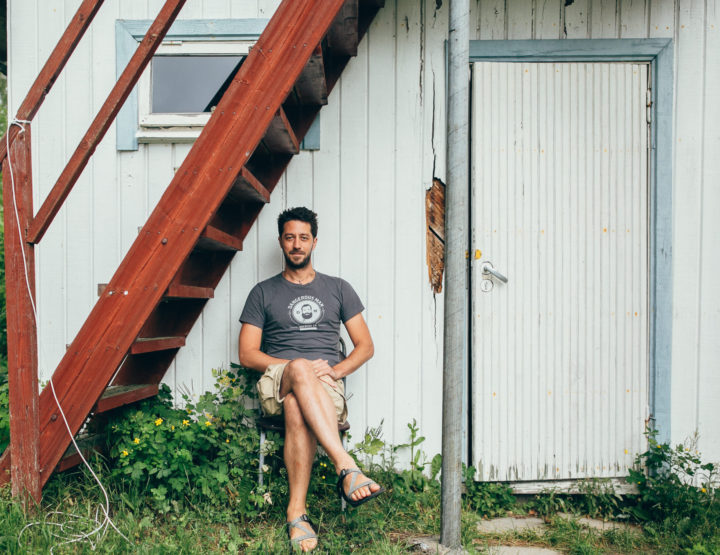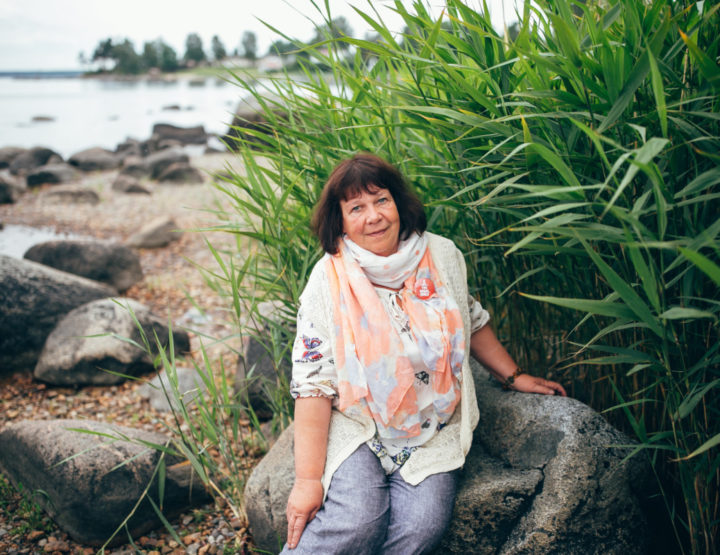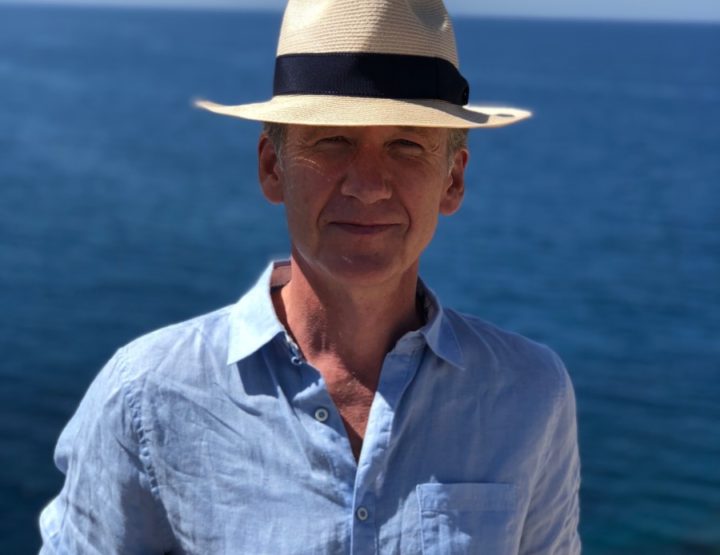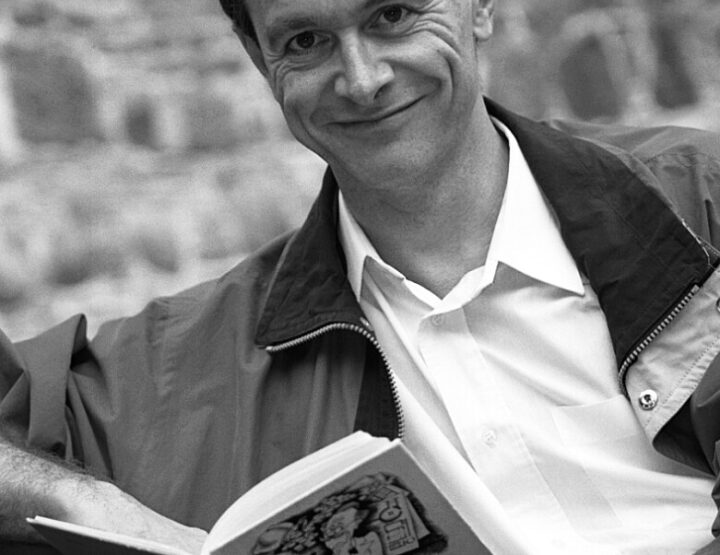The name Rein Sepp (1921-1995) in Estonian culture is above all associated with translations of a number of imposing works of literature. Primarily the ones with ancient Nordic roots: Elder Edda, Younger Edda, Song of the Niebelungs, Parsifal, Beowulf and the Anglo-Saxon Chronicles and Poems. With these translations, Rein Sepp has left an outstanding imprint. There are not too many nations who can boast of full translations of the major Germanic epics. It is the more remarkable that all has been done by just one man. And we also have to consider that in addition to imposed choices connected with his life as a soldier and an outlaw, this man spent seven of his best creative years in a gulag and regarded an academic archipelago as an unsuitable place to live.
Sepp was fond of saying that there are three things that matter in this world: memory, environment and text. The two last were for him inseparable. The text needs a point of support in the landscape, as he explained his method. Look, the place where Siegfried was struck dead by a spear is over there, at the edge of the forest. Each location has a message of its own. So have the texts. Man conveys a message, which must be done as truthfully as possible.
In Sepp’s translations this meant maximal closeness to the original, and steady metre. This is especially evident in reciting while walking, for example marching along the road from one bus stop to the next. Just like the poems of some other poet come to you when you lie on the wooden bench in the Tartu-Elva train manufactured in the 1960s (in South Estonia they were called ‘an arsebreaker’), or bumping up and down in the saddle of an overworked horse in some money-grubbing tourist farm. Texts, a message and traversed landscapes. All nicely in its place. The latter is associated with a dimension that is very much present in texts created or translated by Sepp, and that could perhaps be understood by the expression ‘closeness to earth’. The result is a brilliant and clear usage of words, and lost worlds brought nigh. It seems too much for one translator. Maybe it is. The more I think about Sepp, the more I believe that it was all about a certain perception of the world. Probably a mystic one.
I remember one late June evening preparing a sauna at Rein Sepp’s home – for the last 24 years of his life he lived in a rather dilapidated farmhouse in North Latvia, a place called Ipiki. For firewood we had dragged home a telephone pole sawn in half, and stuck it into the open mouth of the stove. The pole had to be pushed further inside as it burned. In the course of burning up both time and the pole, we sat in front of the sauna, smoked cigarettes and talked about Estonian poets. I praised Uku Masing, as suitable for a fourth-year student. “Well, he wasn’t a bad sort, you know,” said Sepp, “but you often felt befuddled by him. Take the word tont (ghost, demon, devil) for example, that Masing used all the time. What exactly is a tont? Things must have clear names. N. [he mentioned a well-known post-war poet] was a hopeless whiner. A good poet, but whined too much. The fate of everybody in our generation was chaotic, but there have always been hostilities in the world. In Beowulf’s time and in our century.”
I nodded in agreement, smoking one of Rein Sepp’s filterless ‘Belamor’ after another. Fog spread across the kolkhoz landscape, with the contours of the tower showing through where someone was watching the cattle. A strange resemblance with a gulag vyskha, where a machine gunner kept an eye on the prisoners. I had once seen one in a photograph. It felt like night and fog were melting the time – the war was long over, those Estonians who survived had returned, and the Soviet Union was about to collapse, but the prison camp towers still stood. Like ghosts, of whom nobody knows why they exist in the first place, or what their purpose is.
“What exactly did you see in Siberia?” I asked Rein. I was prepared for a prison camp story or a philosophical explanation. “In Siberia?” Rein pensively shook the ash off his cigarette. “What’s there to see? Sky and tundra.” He fell silent. “Things have to be seen against the sky anyway.” At the time, I did not understand what Rein meant by this. I stared at the watchtower and wondered why Rein, who had been sentenced to hard labour and internal exile, never said a bad word about the Soviets. How did he manage to stand above all that? As if he himself had been somewhere higher, watching the frost-bitten guard clapping his mittened hands together in the tower in some remote place in Siberia. And smiled at the sight.
It now seems to me that the sentence Rein uttered that night was perhaps the most valuable one during our six-year friendship. Back then, it did not seem that significant. The pole had burnt down and we undressed and went to the sauna that opened all the pores. An inexperienced sauna-goer emerged later remarkably dirtier and sootier than he had been before.
Years after Rein Sepp’s death I happened to read an 18th century Hassidic treatise that tells about Rabbi Nachman of Breslau. In one episode Nachman notices one of his disciples staring out of the window at the market, and asks him: “Have you already looked at the sky this morning?” “No, teacher,” says the student, “I haven’t had the time for that.” “Believe me,” continues Nachman, “in fifty years time all that will be gone. There will be another market place, other horses, carts, people. I shall not be here, nor will you. What can thus be so important in all this that prevented you from looking at the sky?”
Sepp’s poems, some of which are presented here, are a phenomenon of their own. It is claimed that a poet with something to say writes for himself. Rein wrote for himself and for his nearest and dearest. In most cases it is letter-poetry, not to be separated from the rest of the message. His verses carried further the mood of the letter: they were a peculiar commentary on the latter. His earlier poems can be roughly divided into funny ones and those full of pathos. In the poetry written during the two last decades of his life, those two blended. Translating is a serious business, he once said; you must have some fun somewhere. The same goes for his poems, some of which are indeed funny and a bit surreal. Just as funny as the situation he frequently found himself in. I remember one evening when he entertained the next bunch of guests by reading out loud the Anglo-Saxon long poem, “Owl and Nightingale”. It is a medieval fable, telling about the scholastic competition between the two birds. Relying on the names of King Alfred and Nicholas, Master of Arts, the owl tries at all costs to expose his talents. Rein recited the poem, moving the magnifying glass along the lines. Then he paused. “What a rogue!” he said, clearly amazed. The text had apparently developed a life of its own, and managed to surprise even its own creator. “I used to have an arrogant bird like that at my farmhouse,” said Rein, laying aside the manuscript. “It made a nest in the sauna chimney. I had to wait until the chicks had hatched. For the bird, it was apparently entirely natural.”
I selected his poems with a certain uneasy feeling. It seems that most of them were meant for storing, rather than publication. Secondly, their form is based on the literary tradition that Sepp thought significant, and that have little in common with the contradictory canons of contemporary poetry. At the same time they give an excellent picture of his wisdom of life mixed with humour, and of a yearning for something distant. All that could perhaps be reached by walking in the forests and on the country roads. These poems need no translation, always a good thing, since Rein Sepp felt completely at home both in German and English. “I shall be an astral body soon enough,” he said shortly before his death, “and then there won’t be any more differences or obstacles.”
Thinking back to all the people who visited Sepp in order to gain strength, it seems that the texts might, after all, not be the most important thing, no matter how well translated they are. The message in destroyed and re-created texts, recorded in the course of a thousand years, is one and the same, and people have not bothered to learn from it. It is hardly likely that an economics student at a university, or his wife the dentist, or Rein’s old mates from the gulag days or myself, for that matter, could really grasp what exactly constituted Wilfram von Eschenbach’s genius, or what all those Nordic elfs and gods of the Edda songs were really about. We sat in Rein’s messy farm kitchen and listened to him reciting his translations on the yellowed pages typed on the old Royal typewriter –and we felt something that made us want to come back.
“You going to see Sepp?” asked the cigarette-scrounging Latvian border guards. “That’s an odd old man there.” And without further fuss they let pass even those boozy Ancient Nordic aficionados who had forgotten their passports in Tartu. All that had nothing to do with texts. A text was just a means, one among many. Maybe what is keeping people’s creative side alive is the spark that Rein managed to instil in their lives, and not so much the words written down on paper. A spark that always rises upwards and that people usually let go out in themselves. But even so, it’s never too late. Especially if one has a teacher with enough determination to see further than the market place. “Well, you are now going on like an Anglo-Saxon nightingale,” Rein would probably have said, with a wicked smile. “But as for determination, you may not be entirely wrong.”
Dear Mrs H. Many thanks for the seeds! The day before yesterday, and yesterday too, I was already eager to prepare the flower bed. The weather, alas, was quite freezing. Some people can easily wait for a more suitable time, but our generation has still that wartime anxiety in our veins – what cannot be done today, won’t be done at all. All that restlessness and unease…26 May 1977
Dear T. A thousand thanks from all my heart for your letter. Solitude is indeed not a light matter, it weighs heavy on you, suppresses and pulls you apart. Now, however, it’s so much easier: let the huge world around me go about its business, sometimes pushing – so what; the day decides to be scorching hot – fine by me, or turns more than just cool – I don’t care; the night displays mocking indifference – let it display what it wants; I’ll just lie down on my bed. But despite all that there’s a weirdly annoying element, very much alive in my body and soul that keeps throbbing and even pulsating, and it gives me no peace, being grim and desolate at times, then sad or ecstatically blissful…
27 May 1993
Dear J. So good to hear that you continue your studies over there. Peace and goodwill are the things that keep this world of ours together. Try not to think of the lights of Tallinn so much, then home-sickness won’t be so hard to bear. I wish literary scholarship every success, its role during the next century will perhaps be even greater than now, only if it becomes more like a creative art itself. Life requires more and more flexibility that must be carried by the same human being, its own beginning and its own orientation, a slice of forest on landscape and a grain of dream and a ribbon of fantasy between the full moon and earth. You asked after my life and health – not much change there. I feel old age in my bones, days and nights vanish without a trace, I keep polishing the Elder Edda, then there are all those little chores of a bachelor, haven’t translated anything for a long time…
30 October 1992
Dear H. I’m truly sorry for not having replied sooner. It often happens with me that thousands of half-done things must be finished at the same time, some indeed so urgent that +++++ and my brains are in tatters, all so that I could complete the work I have started, in this case two pieces of the 8th century. They seem different at first sight, but both give a perfect description of absolute solitude, which is perhaps one state of everything that exists and lives… human life is infinitely slow, all chances seem to slip away, before you can properly weigh them… I was born on 23 April 1921 that obviously determined my fate: university was left unfinished, I was the last fox of Corporation Sakala, with orders to maintain that position in 1940 when the corporation was as good as extinct, and only this spring the young kaasvõitlejad men released me from that non-existent duty…
31 July 1989
Dear M. … it seems as if the brain cells are sloshing around in my old skull ever slower these days, naturally I try to convince myself that the resulting thoughts are the more profound, but who needs such thoughts anyway; quietly wrestling with those Anglo-Saxon chronicles, what they thought worthwhile during five centuries fits nicely into two pages…still, I think I have to focus on the 7th and 8th centuries, something tells me they have significant things to tell us… The weather is wonderfully crisp today, too early to thrust the spade into soil, but maybe I’ll just go and potter around a bit…
5 March 1990
Dear A. … getting old is not a cheerful business, although I’m not doing very much at all; the layer of dust in my rooms is hardly thinner than in the dragon’s den in Beowulf, but on the other hand – the more of it there is, the more natural it seems, even cosy, soft as the moss padding at Frigg’s place; so the only worry is to try and finish what I have started… in the hope that the five eposes will offer bits of wisdom and guidance for understanding this world of ours… following the daily events, little details or the whole change of generations, ordinary everyday occurrences or huge festivities, one inevitably notices that the genuinely insignificant things in life are constantly overvalued and the human part in us gets ever smaller… well, sorry for carrying on so, every one of us needs a slice of wisdom, being but a tiny fraction of the this world of ours…
12 January 1988
Willows were made by emotions
and firs were created by gods,
still white is the starlight of oceans
and a landscape established on nods.
And the willows are dreaming for ever
and the fir-trees are living their fates,
and the willows can never and never
turn into golden gates.
Too much is a dream for the willows,
honey too sweet for a bee,
happy man, you, lying in pillows
made by eternity.
June 1971
Be careful, darling, touch none
of those drunkards and wonderful sales.
Only do they as if sleeping for ever,
By planets, cold stars misled:
When awake they could only never
Know exactly their time-scheduled bed.
And you, old man, try your own childhood
all over once again,
enough you’ve been forest and wildwood,
great task and mammoth and brain.
Senility, I am your business
and your moment at childhood lost
and this second time you shall not miss this
at your life-moving, age-drinking cost.
There are slopes for old men and valleys
and for children hills to ascend
and again and again to all alleys
to remind of their meaning and end.
And the globe gets then running and rivers run,
Thought runs into touching and clinging
And out of the setting sun
Come children burning and singing.
4 February 1976
Once upon a time
an ancient word fell down,
first meant to be a thought,
then merely a nought
in need, in need of rime.
Weep, weep, my cloudy clown!
29 March 1973
Sure, the dream is now over:
was it or ever has been?
The sky falls lower and lower
as life on a grey-growing screen.
My days have now all-all-right ended,
what comes is a marvellous fun.
My heart has been finally mended
by thorns of a heart-touching none.
14 July 1971
and so it is: sincere greeting
and be it close or near or far
time but running darkness fleeting
and far away still lies my star
but never mind, as for tomorrow
and as for me I also pass
so take my faults and take my sorrow
and my parasole and bag and glass
for we must forth, yet flee the sun
don’t laugh, old straw, it’s not for fun
it’s for your sake it’s almost only
for all in swarms and those who lonely
yet heavy light still, heavy run
until gravities but seize and seize
and curve down vast eternities
wherever was it morn or prime
whoever said it horn or chime
or was it rhyme and sound and tune
ten thousand years and once too soon
Geschehen Dinge, Wunder kaum.
Einmal ein Bär im Bärentraum
sah seine eigne Frau Bärine
beim Nähen mit der Nähmaschine,
bloss der Augenblick war nicht dabei.
Der Bär nahm morgens die Ursachen,
ging ohne Kost und Gruss und Lachen
und begründete die Treiberei,
die von Anfang an in Halbbetriebe,
weil Bären ziehen vor die Liebe.
Leicht in träumen eine mühle
zog auf wanderschaft
mit sich nahm sie sieben stühle
falls verlust an kraft
zuckte zögernd bei dem gehen
ihren lebenslauf
winde steigen winde wehen
immer sanft: bergauf
bleib nur ständig wandermühle
sei der pfad auch schwer
bei alten dingen schau und fühle
stets die wiederkehr
aus schatten klüften aus der kühle
denk dir ein zuhaus
dreh dich freudig teure mühle
aller nacht voraus
© ELM no 13, autumn 2001




